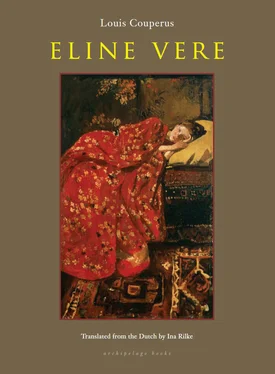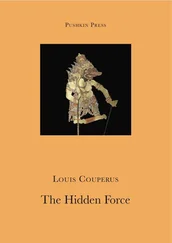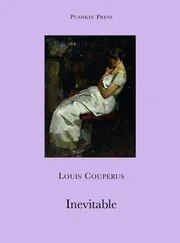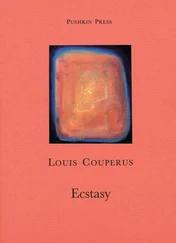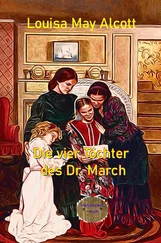‘In that case — oh yes, he would deserve to be forgiven!’ he whispered with indulgent reassurance.
But the indulgence of his tone discomfited her; suddenly she felt that she had given herself away, that she had been open-hearted in a way that was not fitting, that she ought to have had the strength to maintain her reserve.
. .
St Clare was uncertain how long he would stay in Brussels, as he wished to take short trips from there to Mechelen, Antwerp, Bruges and Ghent. Aunt Eliza found him very likeable indeed, but frowned on his intention to tour the northern countries during winter. She was in favour of travelling, but not of suffering from freezing temperatures. St Clare laughed, saying that neither he nor Vincent minded about the cold.
Vincent accompanied him on some of his excursions away from the city, though not all, and during their absences there was much talk of them among the eccentric friends visiting avenue Louise at eleven o’clock of an evening. The Count remarked that he had met St Clare some years since; he appeared to be some sort of chevalier d’industrie, and the Veres would do well to tread with caution. At this Uncle Daniel shrugged his shoulders, but Eline fixed the Count with a stare of withering contempt. Soon afterwards she retired to her bedroom, where she could still hear the high-pitched vociferations of the blonde lady in red velvet and Eliza’s shrieks of laughter.
The carousal in the reception room prevented her from sleeping, notwithstanding the drops she had taken. But despite her wakefulness and the aggravation of the noise, she felt surprisingly calm. The thought of St Clare was reassuring to her, more soothing even than the cool liquid prescribed by the physician. Maybe there was more to life than hypocrisy after all, maybe there was such a thing as true friendship and devotion, in a word: truth.
St Clare and Vincent stayed away for a week, during which they were sorely missed by Eline. They arrived on the day before New Year’s Eve, and Eliza invited them to the soirée she was holding the following evening, which promised to be very grand.
. .
At about half-past nine the following evening the motley collection of guests began to arrive, and Uncle Daniel and Eliza welcomed them warmly. The Count, the actor, the jeweller and his blowsy consort were the first to make their appearance, after which Eline saw a strange review of guests parade past the host and hostess, the men with an air of the nouveau riche, or with bohemian flamboyance, the ladies with oversized diamonds and limp trains to their gowns.
She did not feel at home in this setting, and yet she was amused by all those remarkable people drifting about the reception room so extravagantly furnished with bibelots. The candlelight diffused by the Venetian chandelier glinted strangely over the arrays of antique bronze, antique porcelain and antique fabrics. The guests were all unusual in one way or another, in keeping with Eliza’s avowed dislike of the mundane.
Eline remained somewhat aloof, hovering at the elbows of her uncle and aunt, and was glad to catch sight of St Clare and Vincent as they entered the room. Both were in evening dress, and she found them a markedly distinguished-looking pair.
Once they had presented themselves to their hosts, however, they did not seem to notice Eline in the crush, and she felt rather lost. She was at the mercy of a diminutive, elderly lady with little red plumes in her hair and a face as brown and wrinkled as a walnut, who was talking incessantly of all the deserving painters and sculptors of her acquaintance, and of how she, as a patron of the arts, championed their cause.
‘It is to be an artistic soirée tonight, is it not?’ she asked, narrowing her eyes.
‘Yes I believe it is,’ replied Eline, with mounting discomfiture.
‘You sing, do you not?’
‘Oh no, not any more; my doctor has forbidden it.’
‘I suppose you would have gone on the stage otherwise?’
‘Oh no, I don’t think so. .’
Several gentlemen came forward and bowed to the elderly lady, after which she introduced them all to Eline: composers, musicians, actors, painters, gifted yet misunderstood artists to a man, whose names would doubtless be on everyone’s lips before long.
Being thus encircled by misunderstood geniuses made Eline feel quite dizzy, and she was greatly relieved when she saw St Clare making his way towards her.
‘What a siege!’ he laughed softly. ‘I could hardly get through the crowd.’
Eline pouted.
‘Let’s move to the side a little, there is more room there!’ she lisped, deftly making her escape from the geniuses. With a sigh she subsided on to a pouffe, nervously patting the burnished gold beadwork along her low-cut bodice of black satin.
‘Oh dear, I was already getting quite bored,’ she said with light distaste. ‘But do tell me, how did you fare in Ghent and Bruges?’
He remained standing beside her and told her a little of his excursion, while the throng eddied all around them and footmen went round offering wine, sorbets and cakes.
‘By the way,’ said St Clare, breaking off his account, ‘do you know what the entertainments are to be this evening?’ All eyes were turned on Eliza, who was bobbing and weaving before the Count in apparent supplication.
The Count responded with a show of modest reluctance.
‘Oh, but you can’t let me down! I beseech you!’ wheedled Eliza.
‘I expect she asked him to declaim some poetry, and he’s too shy!’ laughed Eline.
She was right. Eliza darted a look of triumph at the ladies in her vicinity when the Count finally relented. He struck a declamatory pose and cleared his throat. He would recite an epic poem that told of Pizarro’s conquest of Mexico, of Montezuma and the Aztecs.
Voices sank to low whispers, and in the ensuing hush the Count launched into wave upon wave of thunderous Alexandrine verse, with plenty of burring r s. From the far side of the room Vincent sent Eline a mischievous nod. The Count’s voice rose to a shout.
‘Sublime, don’t you agree?’ ventured the elderly lady with the red plumes, who had reappeared at Eline’s side.
Eline gave a confirming nod.
The audience, however, was not unanimous in its appreciation; here and there despairing looks and sighs were exchanged, and the whispering grew louder.
‘Patience and resignation!’ murmured Eline, smiling at St Clare.
He returned her smile. With him standing so close to her, she thought, the long poem didn’t seem half as boring.
When the Count’s final stanza died away at last, the audience was galvanised into motion. There was laughing and jostling once more, and several ladies made a bee-line for the Count to congratulate him on his performance.
‘Couldn’t we seek refuge before the next entertainment begins?’ asked St Clare with a light laugh.
‘We will be more at liberty in the conservatory,’ said Eline.
With some difficulty they threaded their way through the crowd to the small winter garden. It was empty save for a pair of elderly gentlemen seated at a table bearing an assortment of empty wine glasses, and a young man in active conversation with a young lady who kept tapping her knee with her fan. A sultry perfume like a breath of the tropics floated beneath the potted palms, vanilla bushes and orchids. Through the windows they saw a snowstorm of white down whirling in the night.
No sooner had they seated themselves than they heard chords being struck on the piano in the reception room. The actor, a frequent visitor, was in possession of a bass voice, and was to sing some duets with the jeweller’s blonde lady friend, who had garbed herself in blue plush for the occasion. St Clare and Eline could see them reflected in one of the mirrors adorning the winter garden; they were taking up their positions by the piano while their accompanist — one of the misunderstood composers — seated himself to play.
Читать дальше
